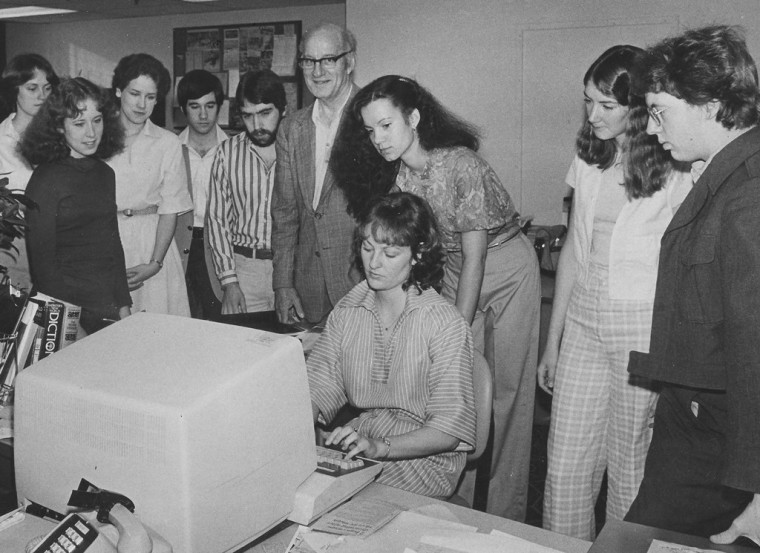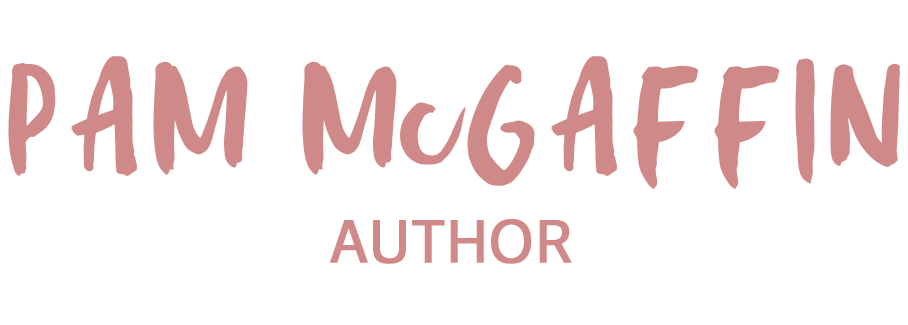In praise of journalism, the profession I loved and left

Members of my journalism class at the University of Washington visit a newspaper in the early 80s (note the gigantic computer). I’m second from the left. To my right is my roommate at the time, Helen Grieve, and standing far right is Author Charles R. Cross. Our professor was the late great William “BJ” Johnston.
After the election, windstorm, scandal, flood, walkout, outbreak, shooting, standoff, explosion or landslide . . . after news breaks, my thoughts inevitably turn to the people whose job it is to deliver it.
I’m thankful — thankful for the work they do and the risks they take covering wars and disasters and Trump rallies. I’m thankful for the news outlets that still exist and the journalists who still have jobs. And I’m thankful — and a little ashamed — that I’m no longer one of them.
I didn’t get laid off like so many of my colleagues. After more than 15 years as a local newspaper reporter, I quit. My husband, Mark Funk (another ex-reporter), and I had just adopted our second child, and I didn’t want to go back to a job that was less than satisfying and hard on families.
So I didn’t. That was 16 years ago, yet I still get that tug in my gut every time a major story breaks. I still have anxiety dreams about being on deadline and looking for a working typewriter (yes, I’m that old). I still have immense respect for the profession at its best (though I’ve yet to see Spotlight).
It was another movie, All the President’s Men, that fueled my interest in journalism in the mid-1970s. When I watched the film and read the book detailing how two young Washington Post reporters unraveled the scandal that brought down then-President Richard Nixon, I was in awe. I wanted to do that.
Full of high-minded idealism about the power of the press, I majored in communications-journalism at the University of Washington and went on to work for a series of small to midsize newspapers, where I covered community news, including fires and traffic accidents and many boring government meetings in which I was one of the few in attendance. I worked a schedule that included nights, weekends and holidays.
And for a long time, I loved it. Here was a license to be nosey — I could ask questions ‘til the cows came home — and learn stuff I never knew I was curious about, like how sewer systems work.
I had stories that landed on the front page many times, even won a few awards, but looking back, I consider myself an only mediocre journalist. I wasn’t fast or fearless or skeptical enough. I didn’t relish confrontation, and I was too concerned with craft (sentence flow, word choice, etc.) to effectively churn out one story after another. I respected deadlines, but I hated them.
Now I’m writing books (actually only one so far), which comes with its own set of challenges, but the hours are mine, I can work in my sweats and slippers, and I get to make stuff up.
Maybe that’s why I feel guilty when I see or read coverage of a major news event. Those reporters and editors have just pulled off another daily miracle — gathering, analyzing, packaging, illustrating, delivering — and I’m sitting here in my sweats eating toast.
The shame I feel is rooted in regret – regret that I didn’t make more of my reporting career or take more risks, regret that I didn’t ask the toughest questions or pursue the most difficult (read investigative) stories.
This I can say: I cared — about fairness, accuracy and getting it right. I was the opposite of the stereotypical hard-boiled, predatory reporter, and so were my colleagues. We all tended to be earnest kind of nerdy word people, motivated more by ideals than our own egos.
I can also say I’m glad to have had the experience. It has given me:
- An ear for the way people really talk;
- A willingness to put my characters through hell;
- A writing style that’s easy to read;
- A gallows (also known as newsroom) sense of humor;
- An ability to work through chaos;
- And a dogged determination to get the story.
That last one is golden.

